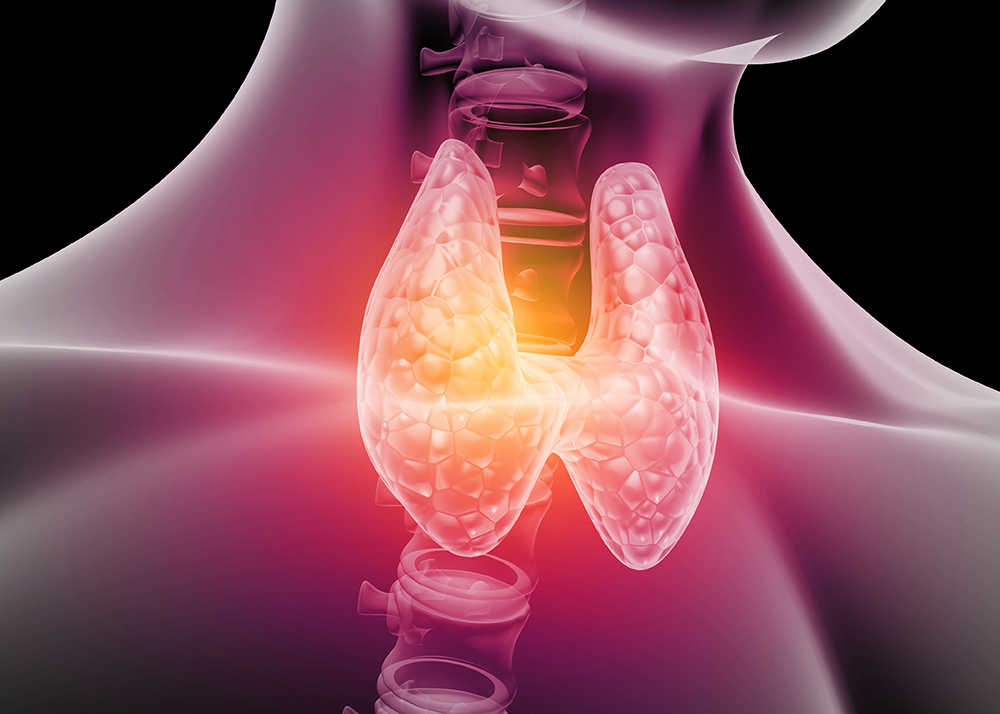
The Endocrine and Neuroendocrine Tumor Program at Rutgers Cancer Institute offers thyroid radiofrequency ablation (RFA), a minimally invasive medical procedure that treats lumps on your thyroid known as nodules. Using a radiofrequency generator under ultrasound-guidance, your doctor directs a carefully controlled amount of energy through the electrode into the tissue to destroy the nodule. With the sustained RFA thermal heat, the nodule is gradually broken down, allowing for a decrease in the size of the nodule over the course of a few months.
Thyroid Nodules and Common Treatment
While surgery can be effective for thyroid nodules, it can leave scarring and can result in long-term effects for patients. This includes: developing hypothyroidism following partial thyroid surgery and requiring life-long medication to supply enough thyroid hormone for your body. This is especially true if you have your entire thyroid gland removed. Patients who have half of their thyroid removed have a 50 percent chance of needing thyroid hormone replacement.
Why Choose RFA instead of Surgery?
Thyroid RFA is a non-surgical treatment for benign thyroid nodules. While surgery results in a visible scar, the RFA procedure is minimally invasive and a safe and relatively quick treatment option. RFA also enables patients to resume normal daily activity with minimal recovery time. While surgery may involve removing part of the thyroid, RFA maintains thyroid integrity, which supports improved thyroid function.
Benefits of Thyroid RFA
- Preserves your healthy thyroid tissue
- Allows your thyroid to function normally without the need for a lifetime of medication
- Minimally invasive procedure with no scarring
- Performed in the office under local anesthesia as an out-patient procedure, which means no hospitalization
- Shorter recovery times
 What happens during the Thyroid RFA Procedure?
What happens during the Thyroid RFA Procedure?
To begin the procedure, you will be asked to lie your head on a small cushion, with your neck extended. Two grounding pads will be placed on your thighs. Your doctor will clean and prepare the skin and then administer local anesthesia in the area surrounding your thyroid. You will be able to breathe, swallow and speak normally during the entire procedure.
A thin needle electrode will be inserted directly into the nodule and the doctor will allow a carefully controlled amount of energy to flow into the tissue to treat the nodule. These changes to the nodule caused by the treatment can be seen in real-time by the doctors performing the procedure. To ensure that you are handling the procedure well, your doctor may ask you how you are doing and whether you can feel any pain. They can easily make adjustments if you are uncomfortable at any time.
With the sustained RFA thermal heat, the affected nodule may be permanently destroyed. Your immune system will break down the affected tissue, shrink the nodule, and then let the affected tissue flow through the body naturally as waste. When the procedure is complete, a small bandage will be placed on the treatment site, and ice packs may be used to cool your neck.
What to Expect After Thyroid RFA
You will be monitored for a short period of time and then discharged. Please check with your physician before the procedure regarding driving as you may need someone to drive you to and from the procedure. You should be able to return to most of your day-to-day activities almost immediately.
Thyroid Radiofrequency Ablation
Learn more about thyroid RFA, who is a good candidate, and what happens during this procedure with Rutgers Cancer Institute expert Dr. Toni Beninato.
How to schedule an appointment
For additional information or to schedule an appointment call 844-CANCERNJ.

